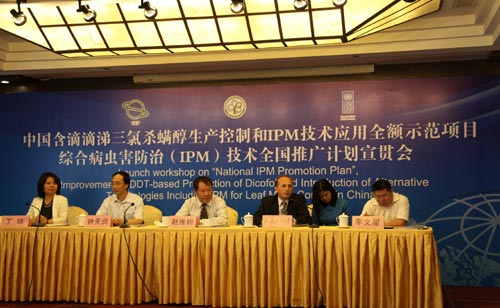UNDP pilot pushes chemical-free drive in China
Updated: 2013-05-28 16:22
By He Yini (chinadaily.com.cn)
|
||||||||
|
 |
|
UNDP China Country Director Christophe Bahuet addresses the launch workshop of the "National IPM Promotion Plan" in Beijing, May 27 2013. [Photo / chinadaily.com.cn] |
The Ministry of Agriculture launched a new national plan on Monday in a bid to replace a DDT-based pesticide – Dicofol – with an eco-friendly alternative technology for agricultural use by 2015.
The plan is based on a pilot project run by the Ministry of Environmental Protection and United Nations Development Program, or UNDP, which has been initiating relatively safer alternative methods that employ green techniques to ward off agricultural pests.
"This inspiring project is an outstanding example of work for sustainable development, as it contributes to China's efforts in both poverty reduction and environmental protection," said Christophe Bahuet, UNDP China Country Director at the launch event.
To date, a total of 100,000 farmers in Shaanxi, Hubei and Shandong provinces have joined the pilot program, and have been trained to use the environmentally-friendly Integrated Pest Management techniques to provide alternative habitats for pests.
The country has stepped up its efforts to tackle environmental problems such as pesticide pollution and air quality, as these problems have been escalating in recent years.
"In addition to boosting farmers' incomes by raising the production of crops and fruit, the project has a positive impact on the environment by cutting down DDT-related emissions and DDT-contaminated waste," said Ding Qiong, director of the Foreign Economic Cooperation Office under the Ministry of Environmental Protection.
According to Ding, some Dicofol production lines have been shut down as the project was pushed forward, which led to DDT production in China being cut by 2,800 tons, DDT-related emissions falling by 350 tons and DDT-contaminated waste reduced by 1,350 tons.

 Michelle lays roses at site along Berlin Wall
Michelle lays roses at site along Berlin Wall
 Historic space lecture in Tiangong-1 commences
Historic space lecture in Tiangong-1 commences
 'Sopranos' Star James Gandolfini dead at 51
'Sopranos' Star James Gandolfini dead at 51
 UN: Number of refugees hits 18-year high
UN: Number of refugees hits 18-year high
 Slide: Jet exercises from aircraft carrier
Slide: Jet exercises from aircraft carrier
 Talks establish fishery hotline
Talks establish fishery hotline
 Foreign buyers eye Chinese drones
Foreign buyers eye Chinese drones
 UN chief hails China's peacekeepers
UN chief hails China's peacekeepers
Most Viewed
Editor's Picks

|

|

|

|

|

|
Today's Top News
Shenzhou X astronaut gives lecture today
US told to reassess duties on Chinese paper
Chinese seek greater share of satellite market
Russia rejects Obama's nuke cut proposal
US immigration bill sees Senate breakthrough
Brazilian cities revoke fare hikes
Moody's warns on China's local govt debt
Air quality in major cities drops in May
US Weekly

|

|







